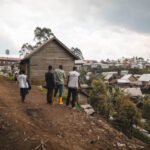The International Organisation for Migration (IOM) and its development partners in Chad have launched an appeal for U.S.$5.2 million to provide shelter, basic necessities, and protection for those vastly affected by floods in the country.
IOM, in a statement, said despite the urgency needed to respond to the worsening situation, funding remains limited to ensuring affected persons receive assistance.
Over 340,000 people from more than 55,000 households have been affected by unprecedented flooding caused by torrential rains across the country over the past weeks, according to the United Nations Office for the Coordination of Humanitarian Affairs (OCHA).
This has already surpassed last year’s figure that saw more than 250,000 persons affected in the country.
It is understood that nearly 2,700 hectares of crops and farming land as well as hundreds of homes have been destroyed by swollen rivers and rains observed in the country since July.
‘The rainy season lasts until October but the humanitarian situation we are witnessing now is already critical’, IOM Chief of Mission in Chad, Anne Kathrin Schaefer, said.
‘As the rains continue, we expect that more people will be displaced but all humanitarian actors are already running out of emergency stocks to assist people’.
IOM, through its Displacement Tracking Matrix (DTM), is working to strengthen its support by rolling out a flood data collection mechanism to accurately capture the extent of flooding in affected areas, the number of victims, and the profiles of affected persons and their needs.
‘The data collected will include information on the impacts of floods on populations and key infrastructures such as houses, schools and health centres, as well as information on affected populations’ profiles and primary needs, in order to better inform the humanitarian response’, IOM Coordinator, Yakin Mwanza, added.
‘This new flood data collection mechanism will be implemented by clusters’ actors and local authorities and will be activated each year during flooding season in order to inform life-saving responses at an early stage of the flooding’.
Each year, parts of Chad are faced with heavy rainfall, however, the rains this year have been unprecedented, characterised by an increase in precipitation and higher degrees of variability which caused flash floods with devastating consequences to thousands.
Photo source: IOM




